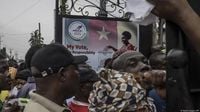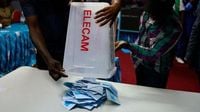Voting has ended in Cameroon’s presidential election, drawing a close to a day marked by calm but cautious participation, as millions of Cameroonians weighed the rare prospect of political change after more than four decades under the same leader. On Sunday, October 12, 2025, polling stations across the Central African nation opened their doors at 8 a.m. and closed by 6 p.m. local time, with more than eight million registered voters expected to cast their ballots at over 31,000 locations, according to BusinessDay and BBC.
At the heart of this election is 92-year-old Paul Biya, the world’s oldest serving head of state, who is seeking an eighth consecutive term after first taking office in 1982. Should he prevail, Biya’s next term would stretch until 2032, further extending his already record-breaking tenure. The president’s bid for continued rule comes at a time when, as reported by BusinessDay, the mood among Cameroonians has shifted. Many citizens, weary of persistent economic hardship and social challenges, expressed a sense of fatigue and a longing for change.
Biya’s main challenger this year is Issa Tchiroma Bakary, a 79-year-old former employment minister and erstwhile government ally, who emerged as a leading opposition candidate after the controversial disqualification of Maurice Kamto. Kamto, once seen as the main opposition figure, was barred from participating by the Constitutional Council in August 2025, a move that drew criticism from rights groups such as Human Rights Watch and cast doubt on the credibility of the election process.
Despite the odds, Tchiroma Bakary’s campaign gained momentum, particularly after Kamto’s exclusion. Tchiroma, who faced threats during the campaign, declared to reporters, “It is not Tchiroma who is the problem. I place myself under the protection of God and the Cameroonian people.” On election day, tensions flared in Garoua—Tchiroma’s hometown and stronghold—where his supporters clashed with security forces. Tear gas was used to disperse crowds after his residence was cordoned off, but Tchiroma remained defiant, stating, “I am at home; I will not move. If they intend to come and take me away from home, I will not move.”
Yet, according to Interior Minister Paul Atanga Nji, voting was “hitch-free” across the country. Nji insisted that the polls were held without major incidents in all ten regions, despite the violence in Garoua and a boycott call in the English-speaking regions. The English-speaking areas, which have experienced separatist unrest since 2016, saw low turnout as many residents stayed away from polling stations for fear of reprisals, echoing the troubled climate of the 2018 elections.
The election unfolded against a backdrop of economic and social challenges. Cameroon, which gained independence from France in 1960, boasts Central Africa’s most diversified economy, rich in oil, gas, timber, and cocoa. Nevertheless, as the World Bank estimates, about 40% of the population lives below the poverty line, and unemployment in urban centers hovers around 35%. Inflation, youth unemployment, corruption, and poor social services were all pressing issues on voters’ minds. As reported by BBC, several opposition candidates, including Tchiroma Bakary and Bello Bouba Maigari—both former northern allies of Biya—campaigned on promises to bring change and address these persistent problems.
At a polling station in Yaoundé, first-time voter Cheukam Ginette, 34, voiced the frustrations of many: “Life is expensive, there are no jobs, the roads are bad, hospitals are worse. We don’t trust the system, but we still have to hope.” Her words captured the mood of a nation at a crossroads, uncertain whether the election would mark a true turning point or merely reinforce the status quo.
Paul Biya, for his part, maintained his typically low profile throughout the campaign. However, he made a rare public appearance on Tuesday, October 7, 2025, in Maroua—a key northern city with 1.2 million eligible voters—where he appeared visibly fit and addressed a rally. After casting his vote in the Bastos neighborhood near the presidential palace, Biya told reporters, “Nothing is certain. Let’s wait until we know the name of the elected official.” His words, reported by BusinessDay, hinted at the uncertainty that has characterized this year’s contest, despite the ruling Cameroon People’s Democratic Movement (CPDM) retaining significant influence over state machinery.
Observers have noted that the 2025 campaign was more competitive than in previous cycles. Political scientist Stephane Akoa told AFP, “The ruling system has ample means at its disposal to get results in its favour. But the campaign has been livelier than usual—this vote could surprise us.” Still, analysts widely consider Biya the favorite, given his long grip on power and the absence of Kamto from the race.
The electoral process is closely monitored, with Elections Cameroon (ELECAM) authorizing 55,000 local and international observers, including a delegation from the African Union. According to the Cameroon electoral code, the Constitutional Council—composed of 11 members appointed by the head of state—has 15 days from the close of polls to declare the official results. This means Cameroonians will likely know the outcome by October 27, 2025. During this period, the Council is tasked with hearing petitions or appeals from aggrieved parties and candidates. If the Council fails to declare a winner within the allotted time, or if the election is canceled, the incumbent president remains in office until a new vote is held within 20 to 40 days.
The government has issued stern warnings against the premature publication of unofficial results, with Interior Minister Nji describing such actions as a “major red line” and threatening legal action against those who attempt to influence public opinion or incite unrest. Several online platforms had announced plans to compile results independently, but authorities have cautioned that only the Constitutional Council is legally empowered to declare the official outcome.
As vote counting continues, Cameroonians are left in suspense, waiting to learn whether the country will embark on a new path or continue under the leadership that has defined it for generations. For many, the election is about more than just the presidency—it is a test of whether Cameroon can begin to break from its entrenched political order and address the deep-rooted issues that have long plagued its society.
With the official results expected within two weeks, the nation holds its breath. The outcome will not only decide who governs but could also signal whether real change is on the horizon or if the familiar rhythms of Cameroonian politics will persist for yet another term.


